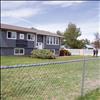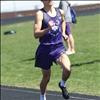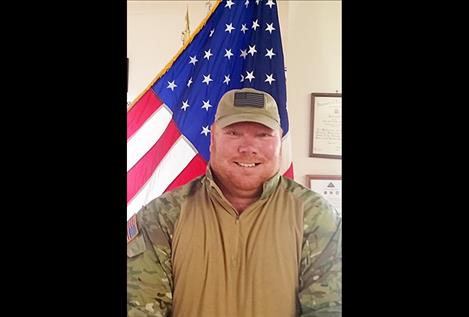Veteran Spotlight
Russell Norman Harbin March 11, 1974 Cold War, Enduring Freedom U.S. Army – ist Infantry Division (Big Red 1) - E-5
Hey savvy news reader! Thanks for choosing local.
You are now reading
1 of 3 free articles.
What could a young man do between his junior and senior years in high school? In Russ’s case, he talked his parents into signing permission for him to join the National Guard. They were not horribly thrilled, but joining the military was all he ever wanted to do, so they agreed. Russ told the recruiter he had two wishes: to be a combat engineer and to be in a tank like his grandfather who was his hero.
Russ went to Fort Dix, New Jersey, in 1991 for basic training and then to Fort Leonard Wood, Missouri, for Advanced Individual Training. He also did a stint with the 163rd Combat Engineer Company out of Missoula. During a two-week assignment in Aurora, Colorado, he and some buddies went out to a little bar where he met some guys from the 10th Special Forces. They were “salt of the earth” guys, and one of them asked him about his plans. Russ said he was thinking about active duty. He was advised to “p___ or get off the pot,” which is military slang for “get serious.” The next day Russ signed up for four years of active duty and continued to use that advice as his motto. He put his heart and soul into a job or didn’t do it at all.
Russ’s first active duty assignment was for two years at Fort Hood, Texas. During Christmas of 1997, he got leave to visit his folks who then lived in Kansas. He also got re-acquainted with a girl from high school who was in Missouri on a church mission. It was “love at first sight,” and in spite of his being shipped out to Schweinfurt, Germany in March of 1998, wedding plans were made for July 4 of that year in the states.
During his time in Germany, Russ had many opportunities to travel around Europe. Borders among European Union countries were open and he could travel with his military identification – no passport required. Special memories include going to Denmark and to the Wartburg Castle in Germany where Martin Luther translated scripture into German. He drove around in his first ever car – a Volkswagen, of course.
The week before Russ’s wedding date, he got orders to go to Kosovo for six months. His fiancé wanted him to tell the Army, “no,” but Russ assured her that wasn’t the way the Army worked, and July 4 turned out to be an “un-wedding day.”
The mission in Kosovo was to divide the warring factions, take weapons away from both sides and to protect the populace. The Orthodox Serbs and Muslim Albanians were historical enemies. Russ’s company flew into Macedonia and crossed into Kosovo to Camp Bondsteel. He was part of the first combat unit “boots on the ground” at the first American base set up after the Special Forces and Seals had gone in. Eventually, thousands of troops were sent in. One of the first things the guys did was to shave their heads because of lice and unsanitary conditions. Everything along the road (burned out vehicles, etc.) was a suspected mine spot and clearing mines was a major part of the job. The troops went door-to-door collecting guns, sometimes forcefully, but they tried to gain the people’s trust to protect them.
Russ also spent time at Camp Monteith, which was a bombed-out Serb base about 20 miles from Camp Bondsteel. Mines were often plastic so the mine detectors couldn’t find them. Troops had to use visual discovery, and when mines were found, they were blown up using bricks of C4 explosives. The Special Forces team had dogs to detect mines. Larger mines were disposed of by the Explosive Ordinance Disposal in special chambers.
In the camps, the troops first lived in tents using “bucket baths” to wash up. Latrines were huts with five seats placed over cut-off 55-gallon drums. Waste was doused with diesel and burned.
Russ also spent time in a burned out schoolhouse that was set up as a command post. It was surrounded by concertina wire but guys could go outside the wire in teams. On one foray, the guys found a hamburger place and had their first hot meal in three months. They also got a shave and a haircut for $1. For a time, Russ was a bodyguard for the commander, so he got to attend some interesting meetings. The commander would meet with Serbs and Albanians separately at community dinners to work on the peace process.
While in Kosovo, Russ’s enlistment was up. He was working in the only job he ever loved and felt a bond and responsibility to his buddies, so he signed for another four years. He still keeps track of some of those guys.
When Russ went from the schoolhouse back to Bondsteel, regular barracks and protective bunkers had been built. This was like living in the “Ritz” compared to the earlier tents. Several famous people came to spend time with the troops. President Bill Clinton was there, but it was his daughter, Chelsea, who got the warm reception. Russ was served Thanksgiving pumpkin pie by actress Salma Hayek. Danica McKellar from “Wonder Years” visited. The Dallas Cowboy and Washington Redskin cheerleaders also visited.
Russ returned to Germany before Christmas of 1999 when the long-awaited wedding took place. They had a civil ceremony and were married by the mayor of Schweinfurt. They had a temple ceremony the next day, so now, they have a two-day anniversary.
Russ’s two-year tour to Germany ended in March 2000. He returned to Fort Lewis, Washington with the Striker Brigade. He was sent to Fort Ord, California, for forward training before his next deployment. He worked with high explosives and anti-vehicle mines with the 12 Bravo Demolition Engineers. He returned to Fort Lewis to attend Sapper School for Special Forces training for combat engineers. During this training, he suffered severe injuries and was given a medical discharge.
After working for the Veterans Administration for a year, he was classified as “unemployable” and terminated from his job. When his injuries were added together he was rated 130 percent disabled.
Russ wishes the VA would be more like the private sector with better communication and better administration. He wishes welfare were as hard to get as VA benefits. He supports VA coverage for veterans being treated by civilian doctors.
Russ is perfectly happy with his choices, though he would wish for no injury. “But look what’s come of it,” he said. “In many ways, it was actually a blessing.” Today he does a lot of volunteer work and “keeps on keeping on.”
Thank you for your service, Russ.

















